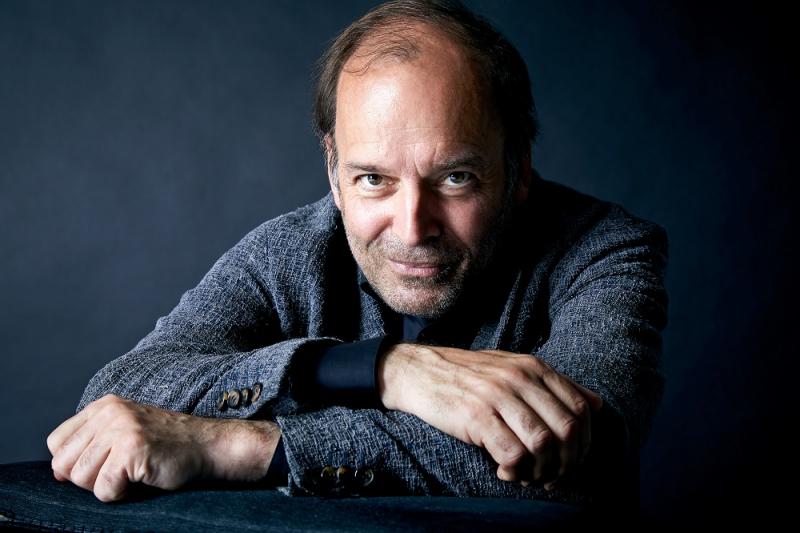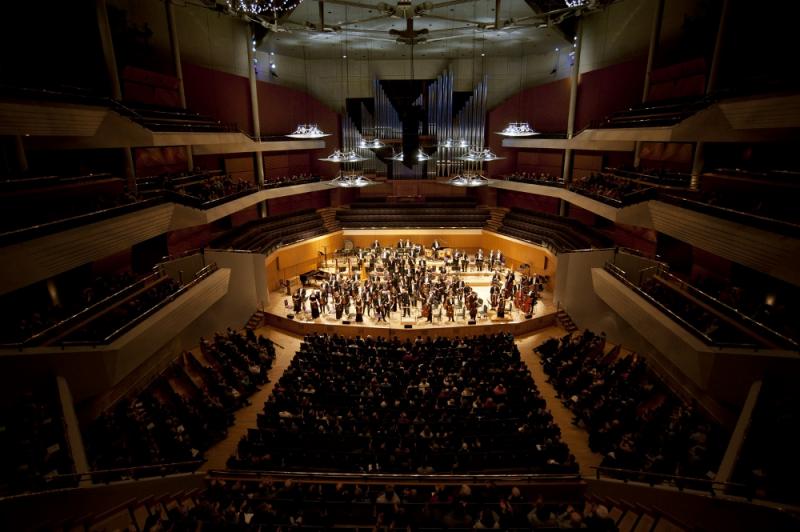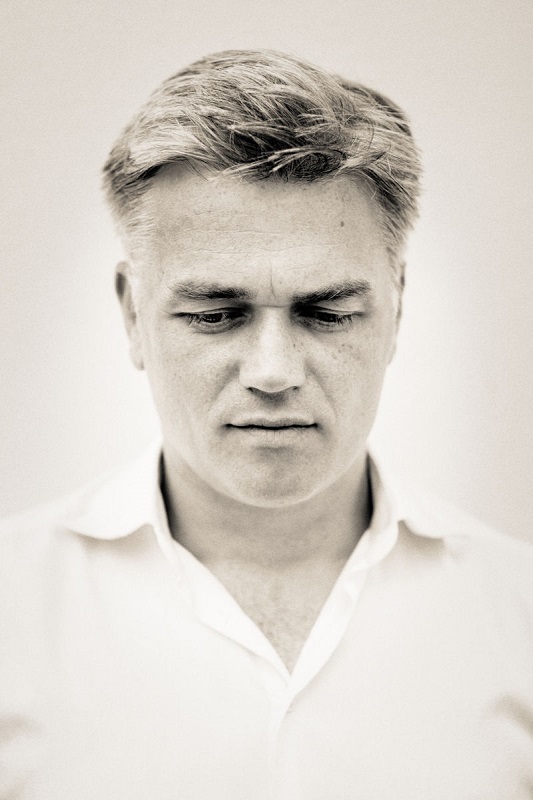Lortie, BBC Philharmonic, Gardner, Bridgewater Hall, Manchester review – whipping up a storm | reviews, news & interviews
Lortie, BBC Philharmonic, Gardner, Bridgewater Hall, Manchester review – whipping up a storm
Lortie, BBC Philharmonic, Gardner, Bridgewater Hall, Manchester review – whipping up a storm
Brisk, brash and exciting music-making blows away the cobwebs

Edward Gardner was back on familiar ground when he conducted in Manchester last night – his high-profile career began when he was appointed as the Hallé’s first-ever assistant conductor, early in Sir Mark Elder’s era – and his rapport with young audiences and ability to command his players has certainly not diminished.
His five-item programme (part of the BBC Philharmonic’s “Journey Through Music”, designed to relate to younger listeners) blew the cobwebs away if any were remaining from the winter break. It was brisk, brash and exciting – a style of music-making the Philharmonic is not always expected to provide but of which it is very capable. Smetana’s overture to The Bartered Bride made a big bang from the outset, followed by the intensively rhythmic fugal passage that can trip ensemble so easily, here icily precise despite a breakneck pace, with entries vividly highlighted. There was room for delicate contouring of melody in the piece, too, with later collective playing of luxuriant, full sound, and finally furious and on the verge of stridency.  The Bridgewater Hall acoustic can merge this kind of delivery and articulation into aural soup all too easily, but it was forgivable as a bright opening statement. (When it came to the Janácek Sinfonietta at the end – the evening was topped and tailed by Czech composers – its grand gestures were the better for it, but that is writing of more open textures.)
The Bridgewater Hall acoustic can merge this kind of delivery and articulation into aural soup all too easily, but it was forgivable as a bright opening statement. (When it came to the Janácek Sinfonietta at the end – the evening was topped and tailed by Czech composers – its grand gestures were the better for it, but that is writing of more open textures.)
The middle of this scheduling sandwich was French: Saint-Saëns, represented by his Piano Concerto No. 4 and his Rhapsodie d’Auvergne, Louis Lortie the soloist in both, and then Berlioz’ "Royal Hunt and Storm" from The Trojans, for no better (and no worse) a reason than that it makes a thrilling 10 minutes’ listening, I guess.
Lortie is a virtuoso and something of a showman – cool as a cucumber in his open-necked shirt and allowing himself the occasional visual flourish to emphasise how much his dazzling technique was suited to Saint-Saëns’ effusions. The concerto is a bit of a rarity – maybe almost as unfamiliar to some on the platform as some in the audience – and is effectively in five sections, though they are labelled as two movements, one of two halves and one of three thirds.
 Its composer’s practice of repeating his gracious but four-square melodies whole until you’re beginning to think they can be too much of a good thing, and of decorating his purple passages with end-of-phrase fireworks (familiar in the better-known "Organ" Symphony) was also there when he wrote this piece, and it needs a kind of shameless showing-off in its projection. Lortie, with Gardner’s help, gave it all that, and added what feeling he could find in the quieter music, too. The conductor, likewise, inspired some passion from the strings (guest led by Daniel Bell) in the Andante of the second movement, and found a degree of nobility in the hymn-like big tune which builds towards the work’s exciting finish.
Its composer’s practice of repeating his gracious but four-square melodies whole until you’re beginning to think they can be too much of a good thing, and of decorating his purple passages with end-of-phrase fireworks (familiar in the better-known "Organ" Symphony) was also there when he wrote this piece, and it needs a kind of shameless showing-off in its projection. Lortie, with Gardner’s help, gave it all that, and added what feeling he could find in the quieter music, too. The conductor, likewise, inspired some passion from the strings (guest led by Daniel Bell) in the Andante of the second movement, and found a degree of nobility in the hymn-like big tune which builds towards the work’s exciting finish.
Rhapsodie d’Auvergne has some of the same qualities – based apparently on a folk-song, it repeats it to death, contrasts it with a lively alternative, indulges in a demonstrative climax and then adds a farandole-like theme to bring things to a bouncy, virtuosic, accelerating and portentous climax, before a softer interlude and a final crash. Lortie and Gardner rose to every temptation, and it was quite a lot of fun.
Likewise the Berlioz: with places now prepared for extra brass players in the high-rise seating behind the platform (ready for Janácek’s Sinfonietta), Gardner (pictured above by Benjamin Ealovega) had his horn and trombone forces stationed there – a touch of Elder-style theatricality – and together they whipped up the storm and then cast a Romantic spell as love conquered all.
The Janácek is an essay in fanfares, wonderful to listen to and a chance for an orchestra to show off, particularly its brass resources. The Philharmonic delivered in spades – with occasional touches of subtlety – and though I don’t think I’ve ever heard mezzo-forte (or pianissimo, for that matter) rendered with quite such full-throated blasts, it knocked us back in our seats and sent everyone home very happy.
rating
Explore topics
Share this article
Add comment
The future of Arts Journalism
You can stop theartsdesk.com closing!
We urgently need financing to survive. Our fundraising drive has thus far raised £49,000 but we need to reach £100,000 or we will be forced to close. Please contribute here: https://gofund.me/c3f6033d
And if you can forward this information to anyone who might assist, we’d be grateful.

Subscribe to theartsdesk.com
Thank you for continuing to read our work on theartsdesk.com. For unlimited access to every article in its entirety, including our archive of more than 15,000 pieces, we're asking for £5 per month or £40 per year. We feel it's a very good deal, and hope you do too.
To take a subscription now simply click here.
And if you're looking for that extra gift for a friend or family member, why not treat them to a theartsdesk.com gift subscription?
more Classical music
 Kempf, Brno Philharmonic, Davies, Bridgewater Hall, Manchester review - European tradition meets American jazz
Bouncing Czechs enjoy their Gershwin and Brubeck alongside Janáček and Dvořák
Kempf, Brno Philharmonic, Davies, Bridgewater Hall, Manchester review - European tradition meets American jazz
Bouncing Czechs enjoy their Gershwin and Brubeck alongside Janáček and Dvořák
 Solomon, OAE, Butt, QEH review - daft Biblical whitewashing with great choruses
Even a top soprano and mezzo can’t make this Handel paean wholly convincing
Solomon, OAE, Butt, QEH review - daft Biblical whitewashing with great choruses
Even a top soprano and mezzo can’t make this Handel paean wholly convincing
 Two-Piano Gala, Kings Place review - shining constellations
London Piano Festival curators and illustrious friends entertain and enlighten
Two-Piano Gala, Kings Place review - shining constellations
London Piano Festival curators and illustrious friends entertain and enlighten
 Echo Vocal Ensemble, Latto, Union Chapel review - eclectic choral programme garlanded with dance
Beautiful singing at the heart of an imaginative and stylistically varied concert
Echo Vocal Ensemble, Latto, Union Chapel review - eclectic choral programme garlanded with dance
Beautiful singing at the heart of an imaginative and stylistically varied concert
 Scott, Irish Baroque Orchestra, Whelan, RIAM, Dublin review - towards a Mozart masterpiece
Characteristic joy and enlightenment from this team, but a valveless horn brings problems
Scott, Irish Baroque Orchestra, Whelan, RIAM, Dublin review - towards a Mozart masterpiece
Characteristic joy and enlightenment from this team, but a valveless horn brings problems
 Classical CDs: Voice flutes, flugelhorns and froth
Baroque sonatas, English orchestral music and an emotionally-charged vocal recital
Classical CDs: Voice flutes, flugelhorns and froth
Baroque sonatas, English orchestral music and an emotionally-charged vocal recital
 Kanneh-Mason, Britten Sinfonia, Shave, Milton Court - a grin and a big beaming smile
A pair of striking contemporary pieces alongside two old favourites
Kanneh-Mason, Britten Sinfonia, Shave, Milton Court - a grin and a big beaming smile
A pair of striking contemporary pieces alongside two old favourites
 theartsdesk at the New Ross Piano Festival - Finghin Collins’ musical rainbow
From revelatory Bach played with astounding maturity by a 22 year old to four-hand jazz
theartsdesk at the New Ross Piano Festival - Finghin Collins’ musical rainbow
From revelatory Bach played with astounding maturity by a 22 year old to four-hand jazz
 First Person: Manchester Camerata's Head of Artistic Planning Clara Marshall Cawley on questioning the status quo
Five days of free events with all sorts of audiences around Manchester starts tomorrow
First Person: Manchester Camerata's Head of Artistic Planning Clara Marshall Cawley on questioning the status quo
Five days of free events with all sorts of audiences around Manchester starts tomorrow
 Goldscheider, Brother Tree Sound, Kings Place review - music of hope from a young composer
Unusual combination of horn, strings and electronics makes for some intriguing listening
Goldscheider, Brother Tree Sound, Kings Place review - music of hope from a young composer
Unusual combination of horn, strings and electronics makes for some intriguing listening

Comments
I felt that Gardner lacked